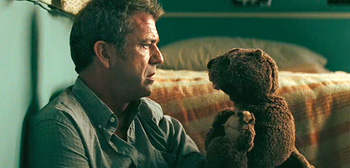 |
| Mel Gibson and friend in The Beaver |
In The Beaver, he looks as if he’s on the verge of a panic attack, or an early exit from the filming of the movie itself. He plays Walter, the successful head of a toy company who has spiraled into a deep depression, to the horror of his wife (played by a dead-serious, deeply invested Foster), the skepticism of his valued colleague (Cherry Jones) and the confusion of his two sons. After a failed suicide attempt, alcoholic Walter happens upon a furry hand puppet in a large trash bin outside his usual liquor store. The beaver speaks to him in a cockney growl halfway between Ray Winstone’s and Michael Caine’s (Gibson’s vocal characterization is pretty terrific). "I’m here to save your goddamn life," it tells him.
And it does, for a while. Letting the beaver take control of business meetings, domestic matters, most everything in his formerly sorry life, Walter frees himself to be a new and better man, albeit a man who speaks in two voices and goes everywhere with a buck-toothed sock on his hand. Walter is but one of several characters in Kyle Killen’s screenplay struggling to locate an authentic sense of self. The older son, played by Anton Yelchin, ghost-writes his high school classmates’ papers and speeches for money. The boy’s awkwardly developing relationship with the class valedictorian (the excellent Jennifer Lawrence of Winter’s Bone) takes up fully half the screen time. Yelchin lacks an animating spark and is merely adequate. Gibson does not lack an animating spark; if anything, he’s shooting off sparks in too many directions. Losing himself in a role rife with discomfiting real-life Gibson parallels, in The Beaver he acts like someone who means it, every moment.
He’s the reason this strange, uncertain picture can’t be dismissed. Somewhere in the rewrites, The Beaver apparently veered from black comedy of an accidentally therapeutic sort to a therapy-first drama with accidental bits of black comedy. Watching Gibson and Foster on screen together again, you’re struck at the unexpected similarities in their borderline-feral intensity. These are performers who do a lot from the neck up, busy every second, rarely in any sort of repose. Their itchy drive sets the tone for the best of the picture, which has been directed with considerable and, I think, misjudged tact by Foster.
She was right to take the central character’s despair seriously. There’s no movie if the viewer can’t do the same. On the other hand, the somber nature of the pacing and atmosphere periodically solemnizes The Beaver into passivity. On the other other hand, the one with the beaver puppet on it: If Foster’s collegial guidance encouraged Gibson to come up with this movie-saving performance, it was probably worth it.



No comments:
Post a Comment